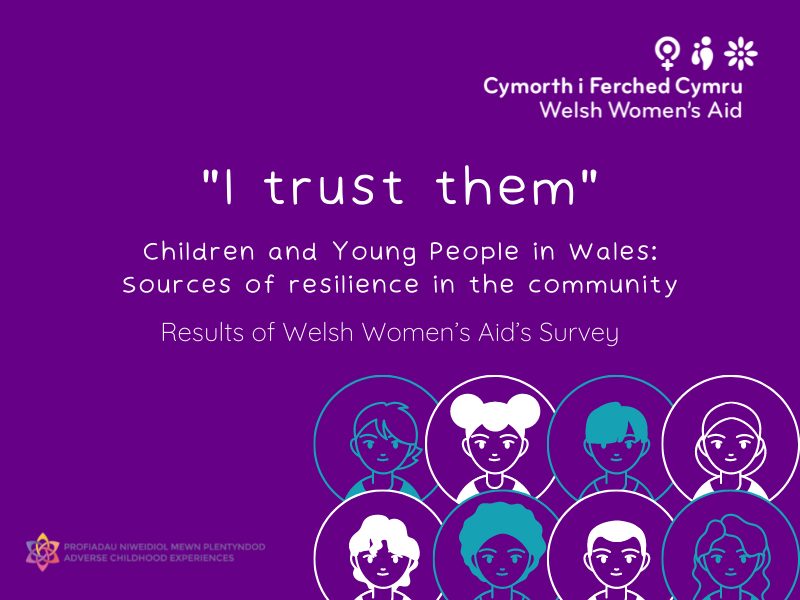
“They’ll just say that’s life so get on with it “
Where young people in Wales are finding sources of ‘resilience’.
Children and young people are turning to online spaces and friends rather than to the Police, education establishments, and employers for support.
A report published today by Welsh Women’s Aid reveals that in a survey of 13–25-year-olds, 80% of participants stated that they would turn to the internet-including to chatrooms, helplines, and online gaming platforms-in times of difficulty, while none of the participants said they would personally seek support from the Police. The report was developed with the support of the Wales Adverse Childhood Experiences (ACEs) Support Hub.
The report ‘I trust them’ comes as Wales prepares for the 2022 implementation of mandatory Relationships and Sexual Education (RSE). Welsh Women’s Aid believes that the success of RSE and the prevention of violence against women, domestic abuse and sexual violence that underpins it, will partly lie in understanding the spaces and figures within communities across Wales that children and young people identify as sources of support and ‘resilience’.
Welsh Women’s Aid Prevention Support Officer, Heddwen Daniels said:
Whole community approaches to prevention can be effective as survivors are likely to disclose abuse or violence to people within their community before accessing official services, but we often design these approaches from an adult perspective- where children and young people seek support and the barriers that they face to accessing it will be different. It is vital that we invest time, resources and empathy into understanding what young people from all backgrounds need to feel safe and supported.
The report has several illuminating findings, most alarmingly that key institutions are not considered accessible, desirable, or trustworthy places to seek support by many young people.
None of the participants said they would seek support from the Police and reflecting on their personal experiences, none of the respondents aged 16-25 said that the Police had been helpful. Black and minoritised young people were nearly half as likely as their White British counterparts to identify the Police as a potential source of support.
Responses around education were also concerning; 50% of respondents who reflected on their experiences within the survey stated that education professionals had been unhelpful. Overall, 43% of respondents said that they had not been helped when they approached teachers for support. The survey revealed that the most common time young people experienced abuse or otherwise difficult times was between ages 11-16, this is particularly unsettling given the sexual harassment and abuse revelations from Everyone’s Invited, with over 90 schools in Wales named on the website.
There is a clear need for schools to be supported with training to provide a needs-led response to children and young people who disclose harassment, abuse or violence. The report also suggests the need to strengthen referral routes to specialist support for children and young people. This is all included in the Welsh Government Good Practice Guidance on a Whole Education Approach, published in 2015, but is clearly not yet being delivered across Wales.
Online spaces and friends were identified as important sources of ‘resilience’,
They make me feel safe and I know I can trust them with the information.
The report highlights that the supportive qualities most valued by young people were getting advice, trust, feeling safe, and not being judged. It also suggests, that with the right support, focusing on the future gave many children and young people who experience violence and abuse strength and resilience.
CEO of Welsh Women’s Aid, Sara Kirkpatrick said
Ensuring that all children and young people get the right support at the earliest opportunity is crucial to preventing violence against women, domestic abuse and sexual violence. Our findings show that a lack of understanding of abuse, combined with a pervasive culture of victim blaming within key institutions are preventing young people across Wales from reaching out to the establishments and people that they should have confidence in to protect them.
We must centre young people’s voices and experiences. This means ensuring that specialist support and advice services are equipped and sustainably funded to understand and support young people through those online communities that they have personally identified as places they are likely to turn to.
Jo Hopkins, Director of the Adverse Childhood Experiences Support Hub in Wales, who supported this project said
Understanding where children and young people seek support and gain resilience from is vital to ensuring support can be tailored to their needs. This research shows the importance of friends, hobbies and online spaces, and that there is less trust in public services, particularly from black and minoritized children and young people. This report amplifies children and young people’s voices, and they must be heard so that their needs can be met within the community and by services.
You can read the full report below:
‘I trust them’ CYP Resilience Survey Report – English
‘I trust them’ CYP Resilience Survey Report – Cymraeg

